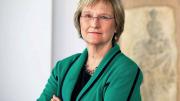How do you measure the impact of a liberal arts education? It is a fundamental question educators face. There are traditional assessments: tests, quizzes, final papers, and projects. Yet can these capture the full weight of a Harvard education? In the long term, what do we do here on campus that stays with our students five, ten, or twenty years after they graduate?
Some might insist we measure the value of a Harvard education in stark terms of financial compensation; a common statistic is the average starting salary for graduates. While we wish for our students to thrive in every dimension, we reject the idea of measuring education achievement by financial gain alone. A liberal arts education should prepare students to lead successful lives, but also curious, meaningful lives that are fulfilling across multiple dimensions. If we do our job well, we have prepared our students not for first jobs, but for enduring and satisfying careers.
We know more now about how people learn than we did even a few decades ago. New technologies have enabled us to see how students engage with digital content, so we can better guide their study habits and research. Our online learning platform, HarvardX, tracks how students progress through courses and gives us valuable data to refine online education. Those findings are translating to the residential setting as well, with professors incorporating new techniques to tailor instruction to the needs of their students. Online tools offer a new generation of assessments and guidance for instructors and students alike.
These are the latest activities in a longstanding quest to evaluate how well—and what exactly—students learn. When I earned my PhD, in 1975, the idea of course evaluations was new. At Harvard, and elsewhere, faculty were resistant to being graded by their students. In the early 1970s, Derek Bok, president of Harvard from 1971 to 1991, initiated the first formal process for students to review their classes. The project began modestly. In 1972, twenty courses were evaluated by students. Today, about ninety percent of Harvard College students submit course reviews, and their input has been essential in making our curriculum and teaching stronger—and insights gleaned from the evaluations also figure into faculty hiring and promotion decisions.
But student evaluations alone are not enough to prove that we are providing the very best instruction. The Harvard Initiative for Learning and Teaching (HILT) catalyzes excellence in learning across campus to meet the pedagogical and technological needs of our students. HILT’s activities—cataloging innovative classrooms around campus, circulating research to instructors, hosting events to bring people together—have elevated these conversations. The work is ongoing: in September, HILT hosted a conference that allowed hundreds of instructors across Harvard to develop new strategies for academic assessment.
The nature of assessment of students has changed as well. The Derek Bok Center for Teaching and Learning has transformed how faculty imagine undergraduate instruction and has initiated a culture shift. The Center challenges students and faculty to contend with questions of engagement and achievement, and has resulted in educationally sound, forward-thinking demonstrations of learning. In an evolutionary biology course, students design a visual arts project to show the evolution of plants; in CS50 Introduction to Computer Science, students present digital products for their peers and participate in hackathons; in a neurobiology class, students conceive of and direct short videos to illuminate biological concepts. The Bok Center, too, has provided invaluable resources to train graduate students as teaching fellows—developing the kinds of instructional and academic skills that will last for their careers.
On a residential campus, learning happens through both formal instruction and chance encounters, through structured lectures and informal time with mentors and with fellow students in the library, the lab, or the Yard. We can evaluate the academic consequences of some of these encounters, but so much of the learning that happens at Harvard occurs outside the classroom and transcends the pages of a grade book or a file of course evaluations. While our graduates may not remember every fact from every lecture, they keep with them the power of the Harvard experience, which has, we hope, imbued them with habits of mind and creative ways of thinking that allow them to flourish.








